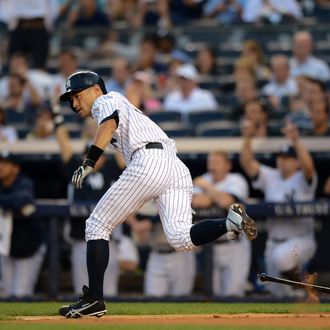
The occasion of Ichiro’s 4,000th professional hit last night feels like it requires a debate over how we should assess a player who split his career between Japan and the United States. That argument would be centered on the following question: Does reaching the milestone mean as much when more than 1,000 of Ichiro’s hits came in a league that’s the second best in the world but still inferior to the American major leagues? (The numbers, if you’re wondering, suggest that, yes, it does matter: Dan Szymborski used his ZiPS system to translate his Japanese numbers and found that his hit count is barely affected — his 1,278 actual hits in Japan would translate to 1,275 in the U.S.) And considering how much we all obsess over round numbers, it’s only natural to want to know how legitimate that number is in this case.
But in at least one way, it doesn’t matter whether 4,000 professional hits is exactly as impressive as we’re trained to think it is because a lot of them came in Japan. Sports fans love round numbers, and we especially love large round numbers — the kind that take a career to accumulate. We make a big deal when a pitcher gets to 300 wins, or a slugger hits his 500th home run, or a hitter gets his 3,000th (or 4,000th) hit, and the main reason we do so is because it allows us a natural opportunity to reflect on the player’s career, which almost by definition is an impressive one. All-time greats like Ichiro deserve this sort of treatment; he and players like him ought to be celebrated as their careers wind down. New York fans have been through this a lot lately, with future Hall of Famers Derek Jeter and Mariano Rivera reaching significant milestones in recent years. The prime of Ichiro’s career happened outside of New York, of course, but he’s in that class of player.
And so too much debate about the legitimacy of Ichiro’s 4,000 hits would obscure what should be (and for the most part is) happening now: a celebration of one of the most iconic baseball players ever. Yankee fans are watching an Ichiro whose best days are behind him, but even if we focus just on his American career, his time in Seattle was incredible. (At least his unorthodox-but-effective slap-swing — the one that helped him pick up an insane 262 hits in 2004 — still remains.) Ichiro’s American numbers are plenty good enough for induction into Cooperstown — he has a .320 career average thanks to a steady stream of singles — but it’s possible he won’t reach any major round-number milestones. (He’s 278 major-league hits away from 3,000, but he turns 40 this fall.) Which means this might be our best opportunity to collectively celebrate his career before it ends. Let’s be sure to take it.





























